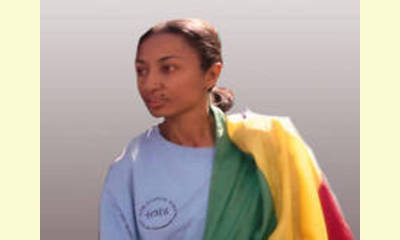|
|
La periodista etíope Reeyot Alemu gana el premio UNESCO-Guillermo Cano de Libertad de Prensa 2013
an article by Servicio de Prensa, UNESCO
La periodista etíope Reeyot Alemu, actualmente
encarcelada, es la ganadora del premio UNESCO-
Guillermo Cano de Libertad de Prensa 2013. Alemu
fue recomendada por un jurado internacional de
profesionales de la información como
reconocimiento a su “valor, resistencia y
compromiso excepcionales con la libertad de
expresión”.

La periodista etíope Reeyot Alemu gana el premio UNESCO-Guillermo Cano de Libertad de Prensa 2013 - (c) IWMF
click on photo to enlarge
El jurado destacó el trabajo de Reeyot Alemu en
numerosas publicaciones independientes. Escribía
de una manera crítica sobre temas políticos y
sociales, centrándose en las causas profundas de
la pobreza y en la igualdad de género. En 2010
fundó su propia editorial y una revista mensual
llamada Change. Ambos están actualmente cerrados.
En 2011, cuando trabajaba como columnista habitual
de Feteh, un semanario nacional, Alemu fue
arrestada. Cumple una condena de cinco años en la
prisión de Kality.
El Premio UNESCO Guillermo Cano de Libertad de
Prensa fue creado en 1997 por el Consejo Ejecutivo
de la UNESCO. Se entrega cada año el 3 de mayo,
durante las celebraciones del Día Mundial de la
Libertad de Prensa, que este año tendrán lugar en
San José de Costa Rica.
El Premio recompensa a un individuo u organización
que haya contribuido de manera notable a la
defensa y/o promoción de la libertad de expresión
en cualquier lugar del mundo, especialmente si lo
ha hecho corriendo algún riesgo. Las candidaturas
son propuestas por los Estados Miembros de la
UNESCO y por organizaciones regionales o
internacionales activas en los ámbitos del
periodismo y la libertad de expresión. Los
ganadores son elegidos por un jurado internacional
cuyos miembros son nombrados por la Directora
General de la UNESCO y se desempeñan durante tres
años renovables una sola vez.
( Clickear aquí para la version inglês, u aquí para la version francês).
|








|
DISCUSSION
Question(s) related to this article:
The courage of Mordecai Vanunu and other whistle-blowers, How can we emulate it in our lives?
* * * * *
Latest reader comment:
Whistle-blowers may be considered as very important actors for a culture of peace. As described on the CPNN page for values, attitudes and actions for a culture of peace, the culture of war is characterized by propaganda, secrecy, government control of media, militaristic language and censorship while the culture of peace is characterized by the free flow and sharing of information. Whistle-blowers break the back of secrecy directly and dramatically.
Mordecai Vanunu's courage continues the tradition of Daniel Ellsberg, who made known the Pentagon Papers during the Vietnam War and Karen Silkwood, who exposed nuclear pollution in the United States. Ellsberg was persecuted by President Nixon and Karen Silkwood was murdered, as described some years ago in a very fine film starring Meryl Streep.
As the amount of government secrecy continues to increase, we may expect that the number of whistle-blowers will also tend to increase in the years to come.

|
|









